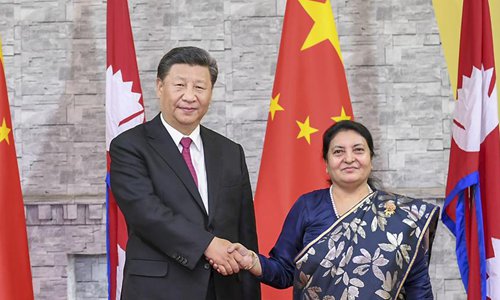HOME >> OPINION
Cozy ties among regional countries crucial for determining the future of South Asia
Source:Global Times Published: 2019/10/17 20:48:42

Chinese President Xi Jinping meets with Nepalese President Bidya Devi Bhandari in Kathmandu, Nepal on Saturday. Photo: Xinhua
Chinese President Xi Jinping's state visit to Nepal, the first by a Chinese president in 23 years, was a historic one that sought to elevate ties with the Himalayan country. The two countries agreed on October 12 to upgrade relations to a strategic partnership of cooperation featuring ever-lasting friendship for development and prosperity. The significant agreement has reflected the values that China persists with: Both big and small countries are equal and can engage in win-win cooperation. The China-Nepal relationship can provide a trustworthy model for other small countries and developing countries to advance their ties with China.China is different from the US or any other Western country in handling relations with other countries. China emphasizes that all countries are equal, while the US pays more attention to the status of countries - it won't really attach importance to a small country. From this aspect, China-Nepal ties are significant for the international system.
The two countries signed about 20 agreements, including content about the construction of cross-border railways. If the two countries are linked with railways, landlocked Nepal will become land-linked with an ideal sea port to export its products. This will give Kathmandu more choices instead of merely relying on New Delhi for export. The cross-border railways will be an extension of China's Qinghai-Tibet Railway, which will link Kathmandu, capital of Nepal, with Gyirong county, Southwest China's Tibet Autonomous Region.
In addition to facilitating trade between the two countries, the railways also reflect that China and Nepal are becoming more and more inseparable.
Nepal is an important country under the framework of the China-proposed Belt and Road Initiative. The two countries vowed to strengthen cooperation in fields including politics, economy, culture and security, in attempt to further deepen ties during President Xi's visit, which is a milestone for China-Nepal ties.
From the relationship with Nepal, we can see the difference between China and India, which is a regional power in South Asia. New Delhi regards the region as its backyard, frequently calls the tune in the region, and blocks other regional countries from cooperating with big countries like China. This Cold War mentality actually goes against the needs of development of the times.
Better ties with China also mean Nepal breaking away from the stifling influence of India. This is important for a sovereign country.
Although Nepal is politically independent, it has hardly been diplomatically independent due to New Delhi's influence. Countries like Sri Lanka, Bangladesh and the Maldives also find themselves in a predicament similar to that of Nepal.
Advancing China-Nepal ties are conducive to multipolarity in politics and diplomacy. Although India says it supports political multipolarity, it has tried to put other South Asian countries under its influence. In the meantime, New Delhi is sensitive to other countries' policies toward South Asia.
Although the informal summit between President Xi and Indian Prime Minister Narendra Modi has made significant achievements, in the long run, we need to pay more attention to what India does than to what it says.
While President Xi was being warmly welcomed in India, the Indian army conducted exercises of record scale in Indian history in China's South Tibet. This was a brutal provocation for China.
Although Indian defense sources have reportedly said the military exercise has nothing to do with President Xi's visit to India and was scheduled much in advance, it belies reason that the Indian army didn't coordinate its schedule with ministry of external affairs.
China-India relations will be affected by India's moves. During talks with Modi, Xi expressed willingness to help India reduce its trade deficit with China. But India still bars Chinese enterprises from investing in India under the pretext of national security. This obviously does not benefit the development of China-India relations.
Xi's visits to India and Nepal have sent a positive signal to the world: China is willing to advance cooperation with all South Asian countries. China has regarded India a friendly neighbor. Only if India can act, as Modi has said, to actively promote relationship with China, will bilateral ties develop and help promote prosperity and stability in South Asia.
The article was compiled by Global Times reporter Xu Hailin based on an interview with Hu Zhiyong, a research fellow at the Institute of International Relations, Shanghai Academy of Social Sciences. opinion@globaltimes.com.cn
Posted in: ASIAN REVIEW